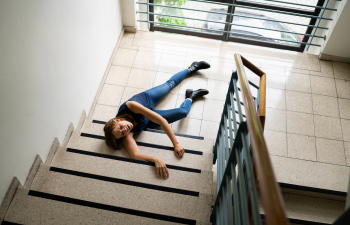Can You Sue for a Slip and Fall on Public Property in South Carolina?

Slip and fall accidents on public property can result in serious injuries, leading victims to wonder whether they have the right to sue for damages. In South Carolina, these cases are governed by specific legal principles, particularly the South Carolina Tort Claims Act (SCTCA). Understanding your rights and the legal process is crucial if you’ve been injured due to hazardous conditions on government-owned property. At CFJ Injury Lawyers, we have decades of experience handling personal injury cases, helping clients navigate the legal complexities of claims against government entities.
Understanding the South Carolina Tort Claims Act
The South Carolina Tort Claims Act (SCTCA) governs lawsuits filed against government entities, including state agencies, municipalities, and public institutions. While sovereign immunity traditionally protected the government from lawsuits, the SCTCA allows injured parties to seek compensation under specific circumstances. However, there are notable limitations:
-
Damage Caps:
Compensation is capped at $300,000 per individual and $600,000 per occurrence (SC Code § 15-78-120).
-
Notice Requirements:
Plaintiffs must provide written notice to the appropriate government entity within two years of the incident (SC Code § 15-78-80).
-
Limited Liability for Certain Conditions:
The government may not be liable if it can prove the hazardous condition was not reported in a reasonable timeframe or that it had no prior knowledge of the issue.
How CFJ Injury Lawyers Can Help You Navigate the Process
Pursuing a slip and fall claim against a government entity requires an experienced legal team that understands the nuances of South Carolina law. CFJ Injury Lawyers has built a strong reputation for successfully handling personal injury cases, including those involving hazardous conditions on public property. Our attorneys are well-versed in the intricate procedural requirements that can make or break a case.
Personalized Legal Strategy
Every slip and fall case is unique, and at CFJ Injury Lawyers, we take the time to thoroughly investigate the circumstances of your accident. Our attorneys will:
- Conduct a detailed review of the incident and gather crucial evidence, including witness statements and surveillance footage.
- Identify whether the government entity had prior knowledge of the hazardous condition.
- Ensure all procedural requirements, such as timely filing of claims and notices, are met.
- Negotiate aggressively with government representatives to seek a fair settlement.
Decades of Experience & Local Knowledge
With over 40 years of combined legal experience, Attorney Catherine F. Juhas and Attorney Eric Saleme have a deep understanding of South Carolina’s legal landscape. Attorney Juhas is licensed in multiple jurisdictions, including South Carolina, North Carolina, Washington D.C., and the U.S. District Court of South Carolina. Attorney Saleme’s bilingual proficiency in Spanish allows our firm to provide exceptional service to South Carolina’s diverse community.
Common Causes of Public Property Slip and Falls
Slip and fall accidents on public property in South Carolina often occur due to:
- Uneven sidewalks or potholes
- Poorly maintained stairways or handrails
- Wet floors in government buildings
- Poor lighting in public parking lots
- Debris or obstacles left in walkways
According to the National Floor Safety Institute, falls account for over 8 million hospital emergency room visits annually in the U.S., making them the leading cause of ER visits (21.3%).
In South Carolina, recent data from the SC Department of Health and Environmental Control shows that over 30% of emergency room visits for injuries result from falls, emphasizing the severity of these accidents.
Client Success Stories
Many of our clients have faced challenging slip and fall cases, but with CFJ Injury Lawyers on their side, they were able to receive the compensation they deserved.
Client Testimonial:
“So what can I say other than 18 months out of work and this firm saw me through until the end. I appreciate it so much, Lindsay and Cathy!!! You guys are the best! Thank you! Thank you!” – Micah Fahner
“Experience with this law firm was very easy, every step of the way with communication, nothing hidden, no guessing—always knew what was going on. They always had my best interest at hand.” – Cordell Parler
FAQs About Slip and Fall Claims on Public Property in South Carolina
Q: How long do I have to file a claim for a slip and fall on public property?
A: Under the South Carolina Tort Claims Act, you must file a notice of claim within two years of the accident. The lawsuit itself must be filed within three years (SC Code § 15-78-110).
Q: Can I sue if my fall was partially my fault?
A: South Carolina follows a modified comparative negligence rule. If you are found less than 51% responsible, you may still recover damages, though your compensation may be reduced based on your percentage of fault.
Q: What if the government says they weren’t aware of the hazard?
A: To hold a government entity liable, you must prove they knew or should have known about the dangerous condition but failed to address it in a timely manner.
Q: What kind of compensation can I receive?
A: If successful, you may recover damages for medical expenses, lost wages, pain and suffering, and rehabilitation costs. However, your total compensation is subject to the SCTCA caps.
Q: Do I need a lawyer to file a claim?
A: While not legally required, having an experienced attorney significantly improves your chances of a favorable outcome, as government claims involve strict procedural rules and deadlines.
Contact CFJ Injury Lawyers for a Free Consultation
If you’ve suffered a slip and fall injury on public property in South Carolina, don’t navigate the legal process alone. Contact CFJ Injury Lawyers for guidance and aggressive representation.
By working with CFJ Injury Lawyers, you gain access to a legal team that understands how to handle government liability claims efficiently and effectively. Let us put our experience to work for you.